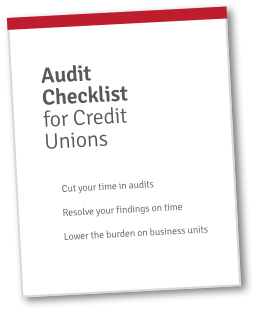There’s a lot to worry about when preparing for credit union exams. Usually, they go smoothly. Often, exams just confirm what you and your credit union already knew: that you’re on the right path.
But the stress is real.
A poorly-run exam increases your credit union’s risk of findings, documents of resolution (the dreaded DORs), and regulatory action.
So, how can you and your audit team properly prepare? We have a handful of tips that work.
But sometimes, just sometimes, you need a little more. You need something that goes beyond standard best practices and good advice.
You need a tailor-made study guide.
So, why not give you two?
Introducing the AIRES Questionnaire
The NCUA knows that credit union exams can stress out even the most high-achieving credit unions. With that in mind, they put together a helpful study guide for credit unions:
It’s called the AIRES questionnaire, and it stands for Automated Integrated Regulatory Examination System.
What a mouthful!
But the AIRES exam questionnaires focus on several key categories, including:
- Information Technology
- Audits
- Member services
That middle one is, as you can probably imagine, extremely helpful.
Here’s what you can do with the AIRES questionnaire:
Because it’s like a playbook for credit union exams, the topics contained therein are likely to be touched upon during an NCUA audit. Credit unions can use the AIRES questionnaire to perform a mock exam. We suggest performing the mock exam internally—before your examiners arrive on site—so that you can familiarize yourself and your credit union with any necessary topics or areas of inquiry.
(Have you read our other blog about the AIRES questionnaire? It might give you some more ideas!)
Also Featuring: The NCUA Supervisory Priorities Letter
To accompany their annual Letter to Credit Unions, the NCUA also delivers a supervisory priorities letter. This letter explicitly states which areas the NCUA wants to focus on each year.
The intended use of the letter is to direct credit union audit programs toward their hot-button issues of the year. Credit unions can use the priorities outlined in the letter to put together a rough study guide to prepare for credit union exams.
For 2019, the NCUA has outlined six areas of emphasis that they plan to touch on, investigate, or ask about. These six areas include:
Bank Secrecy Act compliance
- This is where your Know Your Customer (KYC) expertise comes into play
- Nobody wants your credit union to launder for the next El Chapo
Concentrations of credit
- The NCUA doesn’t want you to overextend your lending capabilities
- They just want to make sure you don’t take big losses if things go south
Consumer compliance
- The NCUA intends to make sure that you’re being good to your members
- Of course you are—you’re a credit union
- Areas of examination include the Home Mortgage Disclosure Act (HMDA), the Military Lending Act (MLA), and Regulations B and E
Current Expected Credit Losses
- As the NCUA continues moving toward CECL, they’ll take every precaution to ensure that credit unions understand (through thorough analysis) how CECL will impact accounting standards for estimating allowances for credit losses
Information systems and assurance
- Cybersecurity will continue to be a high-priority area of inquiry for the NCUA
- For larger credit unions, the NCUA is assessing information security with their new Automated Cybersecurity Examination Toolbox (ACET), so be prepared for some minor changes
Liquidity and interest rate risks
- The NCUA expects market fluctuations in 2019
- Accordingly, they want to ensure that your credit union can meet liquidity requirements
- The NCUA also expects rising interest rates in 2019
- They want to know that your credit union understands how higher interest rates will affect the market value of major financial assets (such as property)
- It’s important to know how interest rates and asset market values will affect changes to people’s net worth, borrowing capacity, and creditworthiness
That’s a lot of supervisory priorities for 2019, so we strongly suggest that you tag the appropriate experts in your credit union to start studying!
Using Both Resources as Study Guides
Credit union exams may be difficult, but at least they’re consistent.
The supervisory priorities letter doesn’t provide the kind of structured study materials that the AIRES questionnaire has. It’s more open-ended. However, it offers a broad view not only of what the NCUA cares about this year, but what they’ll continue to care about for years to come. (e.g. CECL, the ACET, etc.)
On the other hand, the AIRES questionnaire gives credit unions a good platform for a practice test. It’s narrower in focus, but it serves as a good cheat sheet for what to expect during your credit union exams.

FREE: Audit Checklist for Credit Unions
4 key principles and 9 questions to jumpstart your audit planning. From leading credit unions.Additional Resources for Credit Unions
Few people get excited by audits. Fewer still—if anybody—wants those audits to drag on forever.
We’ve dedicated our time to making audits as quick and painless as possible. One of the resources we put together is designed to help with the very thing this blog is about:
We made a credit union audit checklist, and it’s free to use.
We also developed some credit union audit software. One of our clients reported that it reduced the time it took to successfully complete audits by as much as 25%.
Check out some of our other blogs here:
DO CREDIT UNIONS NEED EXTERNAL AUDIT TOOLS?
USING THE NCUA EXAMINER'S GUIDE AS A RESOURCE TO HELP YOUR CREDIT UNION





